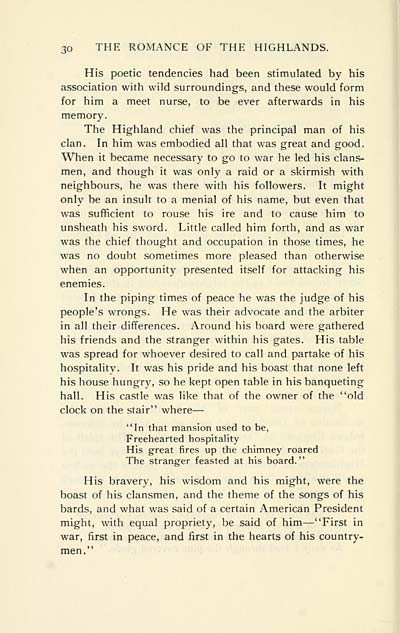Download files
Complete book:
Individual page:
Thumbnail gallery: Grid view | List view

30 THE ROMANCE OF THE HIGHLANDS,
His poetic tendencies had been stimulated by his
association with wild surroundings, and these would form
for him a meet nurse, to be ever afterwards in his
memory.
The Highland chief was the principal man of his
clan. In him was embodied all that was great and good.
When it became necessary to go to war he led his clans-
men, and though it was only a raid or a skirmish with
neighbours, he was there with his followers. It might
only be an insult to a menial of his name, but even that
was sufficient to rouse his ire and to cause him to
unsheath his sword. Little called him forth, and as war
was the chief thought and occupation in those times, he
was no doubt sometimes more pleased than otherwise
when an opportunity presented itself for attacking his
enemies.
In the piping times of peace he was the judge of his
people's wrongs. He was their advocate and the arbiter
in all their differences. Around his board were gathered
his friends and the stranger within his gates. His table
was spread for whoever desired to call and partake of his
hospitalitv. It was his pride and his boast that none left
his house hungry, so he kept open table in his banqueting
hall. His castle was like that of the owner of the "old
clock on the stair" where —
"In that mansion used to be,
Freehearted hospitality
His great fires up the chimney roared
The stranger feasted at his board."
His bravery, his wisdom and his might, were the
boast of his clansmen, and the theme of the songs of his
bards, and what was said of a certain American President
might, with equal propriety, be said of him — "First in
war, first in peace, and first in the hearts of his country-
men."
His poetic tendencies had been stimulated by his
association with wild surroundings, and these would form
for him a meet nurse, to be ever afterwards in his
memory.
The Highland chief was the principal man of his
clan. In him was embodied all that was great and good.
When it became necessary to go to war he led his clans-
men, and though it was only a raid or a skirmish with
neighbours, he was there with his followers. It might
only be an insult to a menial of his name, but even that
was sufficient to rouse his ire and to cause him to
unsheath his sword. Little called him forth, and as war
was the chief thought and occupation in those times, he
was no doubt sometimes more pleased than otherwise
when an opportunity presented itself for attacking his
enemies.
In the piping times of peace he was the judge of his
people's wrongs. He was their advocate and the arbiter
in all their differences. Around his board were gathered
his friends and the stranger within his gates. His table
was spread for whoever desired to call and partake of his
hospitalitv. It was his pride and his boast that none left
his house hungry, so he kept open table in his banqueting
hall. His castle was like that of the owner of the "old
clock on the stair" where —
"In that mansion used to be,
Freehearted hospitality
His great fires up the chimney roared
The stranger feasted at his board."
His bravery, his wisdom and his might, were the
boast of his clansmen, and the theme of the songs of his
bards, and what was said of a certain American President
might, with equal propriety, be said of him — "First in
war, first in peace, and first in the hearts of his country-
men."
Set display mode to: Large image | Transcription
Images and transcriptions on this page, including medium image downloads, may be used under the Creative Commons Attribution 4.0 International Licence unless otherwise stated. ![]()
| Early Gaelic Book Collections > Ossian Collection > Romance of the Highlands > (58) |
|---|
| Permanent URL | https://digital.nls.uk/81816321 |
|---|
| Description | Selected books from the Ossian Collection of 327 volumes, originally assembled by J. Norman Methven of Perth. Different editions and translations of James MacPherson's epic poem 'Ossian', some with a map of the 'Kingdom of Connor'. Also secondary material relating to Ossianic poetry and the Ossian controversy. |
|---|
| Description | Selected items from five 'Special and Named Printed Collections'. Includes books in Gaelic and other Celtic languages, works about the Gaels, their languages, literature, culture and history. |
|---|

